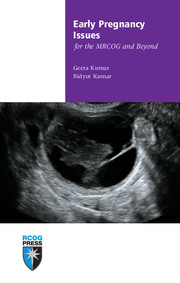Book contents
- Frontmatter
- Contents
- Dedication and acknowledgement
- About the authors
- Abbreviations
- Preface
- 1 Embryogenesis and physiology
- 2 Miscarriage
- 3 Recurrent miscarriage
- 4 Ectopic pregnancy
- 5 Trophoblastic disease
- 6 Hyperemesis gravidarum
- 7 Abdominal and pelvic pain in early pregnancy
- 8 Prescribing issues
- 9 Ultrasound and screening
- Further reading
- Index
- Published titles in the MRCOG and Beyond series
2 - Miscarriage
Published online by Cambridge University Press: 05 July 2014
- Frontmatter
- Contents
- Dedication and acknowledgement
- About the authors
- Abbreviations
- Preface
- 1 Embryogenesis and physiology
- 2 Miscarriage
- 3 Recurrent miscarriage
- 4 Ectopic pregnancy
- 5 Trophoblastic disease
- 6 Hyperemesis gravidarum
- 7 Abdominal and pelvic pain in early pregnancy
- 8 Prescribing issues
- 9 Ultrasound and screening
- Further reading
- Index
- Published titles in the MRCOG and Beyond series
Summary
Miscarriage is the most common early pregnancy complication, with an incidence of approximately 15–20% of all clinically recognised pregnancies. The vast majority of miscarriages occur before 12 weeks of gestation and less than 5% occur after detection of fetal heart activity. Miscarriage is not only associated with significant psychological distress for the woman and her partner but also contributes towards a serious burden for healthcare providers. There is good evidence to suggest that appropriate counselling and support to women after miscarriage offers significant beneficial effects.
Definition of miscarriage
Miscarriage is generally defined in the UK as the loss of an intrauterine pregnancy before 24 completed weeks of gestation. The World Health Organization (WHO) defines miscarriage as ‘the expulsion from its mother of an embryo or fetus weighing 500 g or less, corresponding to a gestational age of up to 20 completed weeks of gestation with no signs of life’.
With advances in neonatal intensive care and the survival of some babies born before 24 weeks, the WHO definition seems to be the preferred one for most international epidemiological studies.
Miscarriage is traditionally classed as first-trimester or early miscarriage when it occurs before 12 weeks of gestation and as second- or mid-trimester or late miscarriage between 12 and 24 weeks of gestation.
Terminology
Medical terminology for miscarriage has changed over time and it is now widely accepted that the term ‘abortion’ should be avoided when describing spontaneous miscarriage. The European Society for Human Reproduction and Embryology (ESHRE) special interest group for early pregnancy has published recommendations for appropriate terminology to be used in relation to miscarriage to ensure clarity and consistency (Table 2.1).
- Type
- Chapter
- Information
- Early Pregnancy Issues for the MRCOG and Beyond , pp. 15 - 31Publisher: Cambridge University PressPrint publication year: 2011

